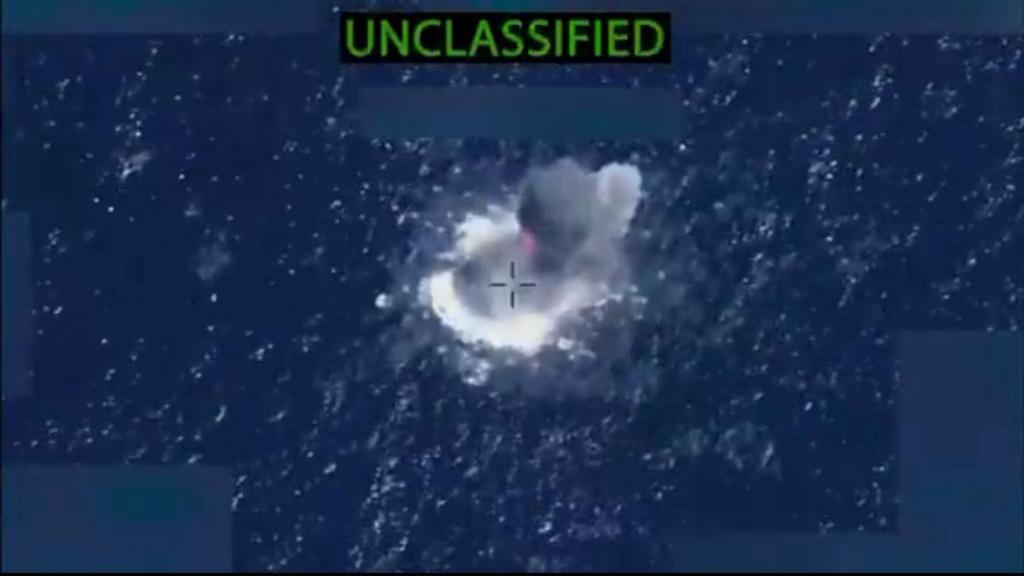U.S. forces have reportedly killed 14 individuals in strikes targeting four vessels suspected of drug trafficking in the Pacific Ocean, according to Defense Secretary Pete Hegseth.
The Mexican Navy has stated it is conducting a search for a potential lone survivor approximately 400 miles (643km) from the Pacific coastal city of Acapulco.
These strikes represent the latest in a series of actions against vessels the U.S. alleges are involved in narcotics transportation in both the Pacific and Caribbean regions.
The recent operations in the eastern Pacific, which Secretary Hegseth indicated occurred on Monday under the direction of President Donald Trump, signify an escalation in what the U.S. government has framed as a campaign to curtail the flow of narcotics into the country.
These strikes have elicited condemnation from regional entities, and legal experts have raised questions regarding their legality. Furthermore, members of the U.S. Congress, spanning both Democratic and Republican parties, have voiced concerns and questioned the president’s authority to authorize such actions.
Mexican President Claudia Sheinbaum addressed the issue during her morning press conference, stating, “We do not agree with these attacks.” She further noted that she has requested the country’s foreign minister, along with representatives from the navy, to engage in discussions with the U.S. ambassador.
“We want all international treaties to be respected,” she added.
The strikes have resulted in at least 57 fatalities to date, contributing to escalating tensions between the U.S. and the governments of Colombia and Venezuela.
While the majority of strikes have occurred off the coast of South America in the Caribbean, the U.S. has recently shifted its focus to the Pacific Ocean as well.
In a statement released on X, Secretary Hegseth asserted that the four vessels targeted on Monday “were known by our intelligence apparatus, transitioning along known narco-trafficking routes and carrying narcotics.”
He further stated that eight “narco-terrorists” were killed in the initial strike, followed by four and three fatalities in the subsequent two strikes, respectively.
According to Secretary Hegseth, one individual survived the strikes, and Mexican search-and-rescue authorities “accepted the case and assumed responsibility for coordinating the rescue.”
The condition and current whereabouts of the survivor remain unclear. The Mexican Navy issued a statement indicating that it had dispatched a patrol boat and an aircraft to conduct search operations aimed at “safeguarding human life at sea.”
Secretary Hegseth’s post included video footage depicting several vessels ablaze after being struck by U.S. munitions.
“The department has spent over two decades defending other homelands,” he wrote. “Now, we’re defending our own.”
At least four of the strikes have taken place in the Pacific, a significant drug-trafficking corridor, while the remaining operations have occurred in the Caribbean.
President Trump has asserted his legal authority to continue targeting vessels in international waters. However, he suggested last week that he may seek congressional approval if the campaign expands to include land-based targets.
President Trump has stated his readiness to strike land-based targets, which would constitute a significant escalation of the campaign.
The strikes have faced criticism from international law experts and the governments of Venezuela and Colombia.
Mary Ellen O’Connell, an international law expert at Notre Dame University and former military educator with the defense department, stated that “criminal suspects are entitled to due process.”
“It is a greater crime to summarily execute people suspected of drug trafficking than drug trafficking is,” she added.
In an interview with the BBC’s Newsday programme last week, Colombian Deputy Foreign Minister Mauricio Jaramillo described the strikes as “disproportionate and outside international law.”
Mr. Jaramillo stated that those on the vessels had “no possibility to defend themselves” and were struck with “no process” and “no judicial order.”
The strikes coincide with escalating tensions with both the Colombian and Venezuelan governments. The U.S. has imposed sanctions on Colombian President Gustavo Petro, accusing him of failing to curb drug trafficking and allowing cartels to “flourish.”
In the Caribbean, the U.S. has deployed troops, aircraft, and naval vessels and ordered the USS Gerald R Ford, the world’s largest warship, to the area last week.
President Trump has accused Venezuelan President Nicolas Maduro of leading a drug-trafficking organization, allegations Mr. Maduro denies. Concerns are growing in Venezuela that the U.S. military build-up aims to remove Mr. Maduro, a long-time opponent of President Trump, from power.
Venezuela’s Attorney General told the BBC there is “no doubt” that President Trump is attempting to overthrow the Venezuelan government. He accused the U.S. of seeking to seize the country’s natural resources, including reserves of gold, oil, and copper.
The U.S. is among numerous nations that do not recognize Mr. Maduro as Venezuela’s legitimate leader, following the 2024 election that was widely dismissed as neither free nor fair. Opposition tallies from polling stations indicated their candidate won by a significant margin.
The states argue the Trump administration should use an emergency fund for the programme, which helps about 40 million people.
His lawyers invoked presidential immunity and claimed the prosecution was politically motivated.
He accuses them of hiding alleged dangers from the drug, following the Trump administration’s unproven claim it is linked to autism.
General Albert Pike’s statue, toppled during George Floyd protests in 2020, is restored under orders from President Donald Trump.
Trump’s closest ally in Europe will head to Washington in the midst of a disagreement over Russian oil.

